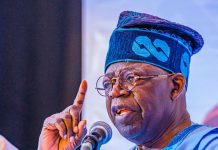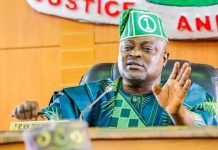The Independent National Electoral Commission (INEC) has said the winner of the 2023 presidential election must score the highest number of votes and the required two-thirds spread in the 36 States of the federation as contained in the Electoral Act 2022 and the 1999 Constitution (as amended).
INEC National Commissioner and Chairman, Information and Voter Education Committee, Festus Okoye, said this on Monday, in Lagos, at the ongoing two-day media capacity-building workshop on the commission’s progress, innovations, preparations for the 2023 general elections and critical issues in the Electoral Act 2022.
He said, “The determination of the winners of any election conducted by INEC is governed by the constitution, the Electoral Act and the regulations and guidelines of the commission.
“The determination of winners for presidential and governorship elections are governed by a different constitutional and legal threshold from seats in the national and state assemblies which are simply ‘first past the post.’
“By section 134 of the Constitution where there are more than two presidential candidates, for a presidential candidate to be declared duly elected, he must secure the highest number of votes cast at the election; and not less than a quarter of the votes cast at the election in each of at least two-thirds of all the States in the Federation and the Federal Capital Territory, Abuja.
“In a governorship contest, the candidate must secure the highest number of votes cast and quarters of the votes cast in two-thirds of all the Local Government Areas of the State.”
Okoye explained that in a situation where winners fail to emerge at first ballot, the rule specifies that two candidates among the participating political parties would take part in the fresh election.
He said the first will be the presidential candidate that secured the highest number of lawful votes in the federation and the second is the one amongst the remaining candidates who have a majority of votes in the highest number of States
“In the event of a candidate not securing this threshold, the Commission must conduct a second election. Not all the 18 registered political parties sponsoring candidates will participate in this second election.
“Only two political parties and two candidates will be on the ballot for the second or runoff election.
“The first will be the presidential candidate that secured the highest number of lawful votes across the federation.
“The second is the one among the remaining candidates that have a majority of votes in the highest number of states. However, where there is more than one candidate with a majority of the votes in the highest number of states, the candidate among them with the highest total votes cast at the election shall be the second candidate for election”, he said.
The INEC commissioner said that the Electoral Act 2022 has validated the technological innovations deployed by the commission.
He said INEC has cemented the place of the Smart Card Readers/Bimodal Voter Accreditation System (BVAS) in the voter accreditation process, which was hitherto an administrative decision provided in the commission’s Regulations and Guidelines for the Conduct of Elections.
According to him, the Supreme Court applauded the introduction of Smart Card Readers in the Electoral Process, particularly in the case of WIKE EZENWO NYESOM v. HON. (DR.) DAKUKU ADOL PETERSIDE & ORS (2016) LPELR-40036(SC).
“It must be appreciated from the outset that Smart Card Reader Machine or simply Card Reader (SCRM for short), is an innovation in our Electoral Process. It was not known, or rather, it was never put into practice before in our political development.
“From my general reading and my comprehension of the literature surrounding the Smart Card Reader Machine, it appears to me and, put in a concise form, that the Smart Card Reader Machine is a technological device set up to authenticate and verify, on election day a permanent voter’s card (PVC) issued by INEC.
“Smart Card Reader Machine is designed to read the information contained in the embedded chip of the Permanent Voter’s Card (PVC) issued by INEC to verify the authenticity of the PVC and also carry out a verification of the intending voter by matching the biometrics contained from the voter on the spot with the ones stored on the PVC.
“INEC’s motive, which became public in introducing the technologically-based device, barring any technical mishap, breakdown or malfunction, was to ensure a credible, transparent, free and fair election for the country”, Okoye said.
He also said that in Section 42 of the Electoral act, a mistake in the logo of a political party will not invalidate any election, as all political parties would be given the opportunity to inspect the political parties’ logo before elections.
He said, “A political party, aspirant or candidate that contravenes any of the provisions of section (92) of the Act commits an offence and is liable on conviction in the case of an aspirant or candidate, to a maximum fine of N1,000,000 or imprisonment for a term of 12 months; and in the case of a political party, to a fine of N2,000,000 in the first instance, and N1,000,000 for any subsequent offence.
“A person or group of persons who aids or abets a political party, an aspirant or a candidate in contravening the provisions of section 92(5) relating to the employment of violence, commits an offence and is liable on conviction to a fine of N500,000 or imprisonment for a term of three years or both.
“Section 93 of the Act also prohibits the use of force violence during campaigns and still prescribes penalties for candidates, aspirants, or persons or groups of persons that use force or compel the use of force during political campaigns.”
Okoye also said, “The country is facing challenges of terrorism, banditry, kidnapping and hostage-taking, secessionist agitations, farmers/herders clashes and a myriad of other challenges. There are internally displaced persons in several states of the federation and some of them are in camps, while others are in the houses of friends and relatives.
“The commission will recreate the polling units and registration centres of IDPs encamped in their state and federal constituency as well as senatorial district and state constituencies and allow them to exercise their democratic mandate of free choice.”





